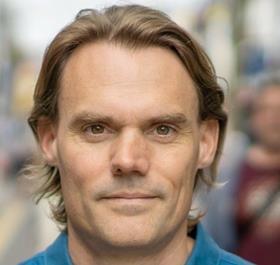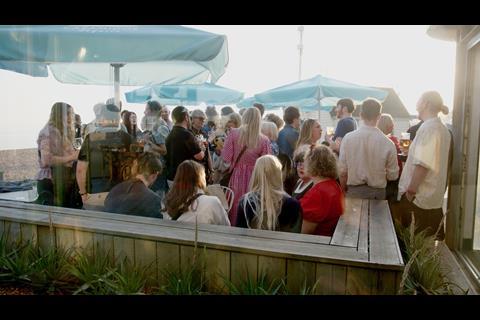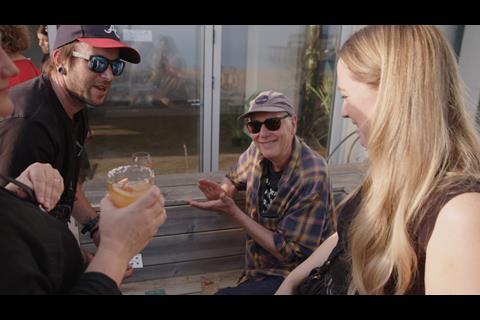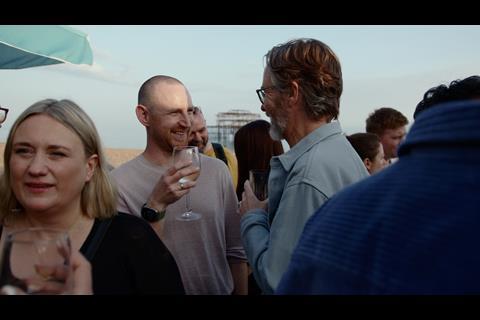Dave Austin at The Edit explains how the city has evolved from a fledgling regional player into a thriving creative powerhouse
We recently gathered to celebrate 20 years of The Edit (see pictures above), the post production facility I founded in 2005 in Brighton. On a gorgeous sunny evening at a beach-side venue, there I was, standing among colleagues, clients, collaborators, and friends and I found myself reflecting on Brighton’s remarkable journey over the last two decades.
The depth of creative talent in this iconic seaside city is undeniable. Since I’ve lived here, Brighton’s television scene has evolved from a fledgling regional player into a thriving creative powerhouse—and it’s a story that disproves the notion that “regional” means second-tier.
Back in the early noughties, Brighton was just beginning to stake its claim in the UK’s television and post-production landscape. Its proximity to London—just an hour by train—combined with Ofcom’s drive for public service broadcasters to level-up and spend more outside of the capital, created an ideal environment for independent production companies to flourish here. And, given the already thriving music, art, gaming and web sectors at that time, it seems natural now that Brighton should evolve into a magnet for ambitious TV and film creatives too.
Brighton’s production ecosystem has been shaped by a growing raft of standout indie companies. Names like Blast Films, Ricochet, Middlechild, Lambent, Factory Films, Big Wave, Superlative, Crackit, Screendog, Back2Back, Seventh Art, Studio Crook and most recently H&VE and Circle Circle, have all contributed to the city’s reputation as one of the UK’s most dynamic media hubs. Each has helped prove that regional does not mean lesser—instead, Brighton offers a distinctively different flavour of innovation and creativity.
Brighton-based productions have made significant marks on the national and international stage. Shows such as Blast Films’ Night Coppers and Saving Lives at Sea have demonstrated the city’s capacity to deliver compelling programmes that resonate widely with the public. The Repair Shop, the heartfelt series produced by Ricochet for the BBC, is consistently voted one of the nation’s favourites. And last year, Channel 4’s The Jury, produced by Screendog, broke new ground with its fresh, part-drama, part-reality format. It was Channel 4’s most successful unscripted launch in a decade and highlighted Brighton’s knack for generating impactful new ideas.
Technical advancements over the last two decades have ushered in seismic shifts in the way we work in production and post including a wholesale shift to file-based production and a revolution in resolution and image quality. Most recently, AI tools are helping us transcribe rushes, cleanup audio, refine grades and produce better and better results, more efficiently. But the innovations that have really transformed regional production are the ones that overcome distance.
The necessity to work remotely during the pandemic shifted attitudes and accelerated the adoption of remote services, allowing regional facilities to reposition themselves and work with anyone, regardless of location. You can now work with the editor of your choice regardless of distance - and approval copies can be sent to commissioners in minutes, not hours (remember sending VHS tapes half way across the country?)
Voice talent no longer travels for their work because they don’t need to - at The Edit we increasingly record VO and ADR with local artists and actors for projects based all over the world. Of course nothing quite beats the in-person experience, and with most of our workforce and clients living within a few miles, our facility still bustles with creative activity.
The journey of the last two decades hasn’t been without its challenges. Regional TV companies have faced lean years and shifting industry dynamics. Yet Brighton’s creative community has shown remarkable resilience, adaptability, and commitment—qualities that have secured its place as a genuine creative powerhouse.
As we marked two decades of The Edit, the celebration felt bigger than just one company’s milestone. It was a testament to how far the industry in Brighton has come in that time—the city has proven time and again that being regional is not a limitation, but a unique advantage. Brighton’s future as a creative hub looks brighter than ever, and I’m proud to be part of this extraordinary story.

Dave Austin is founder of The Edit












No comments yet